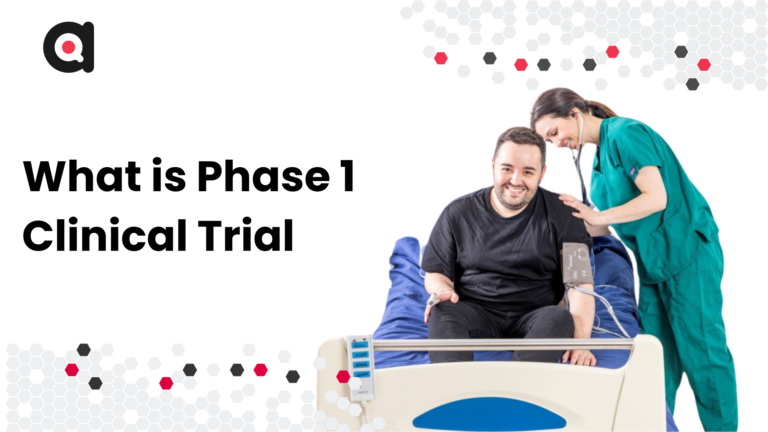What is a Phase 1 Clinical Trial?
Table of Contents
Toggle
The Phase 1 clinical trial is the first stage in the clinical testing of a new drug or treatment in humans. This is primarily concerned with assessing the safety, tolerability, pharmacokinetics (how the body absorbs, distributes, metabolizes, and excretes a drug), and pharmacodynamics (the effects of the drug on the body) of the compound.
Thanks to technological advancements, the integration of AQ CTMS into Phase 1 clinical trials can significantly enhance the efficiency, safety, and compliance of these crucial early-stage studies. It helps set a strong foundation for the subsequent phases of clinical research.
Now let’s briefly discuss, to understand what is phase 1 clinical trial.
Objective of Phase 1 Clinical Trial
Conducting a Phase 1 clinical trial involves stringent ethical considerations, including obtaining proper ethical approvals and ensuring informed consent from all participants. The trial must be conducted under rigorous regulatory oversight to guarantee the safety of participants and the credibility of the data collected.
AQ CTMS supports these ethical and regulatory aspects by providing robust tools for documentation, data security, and compliance tracking, ensuring that the trial upholds the highest standards of clinical research integrity.
Duration of Phase 1 Clinical Trial
The duration of Phase 1 clinical trials varies but typically spans 1-2 years. This period is crucial for collecting comprehensive safety and dosage data.
AQ CTMS can significantly contribute to efficiency during this phase by providing tools for scheduling, resource management, and timeline tracking, ensuring that the trial proceeds smoothly and within the stipulated timeframe.
Participants in Phase 1 Clinical Trial
Phase 1 trials typically involve a small group of 20-100 participants. These individuals are usually healthy volunteers, but in some cases, particularly when the drug is intended for severe or life-threatening conditions, patients with the illness may also participate.
The use of AQ CTMS is pivotal in this phase for maintaining accurate records of participant information, managing consent forms, and tracking the health status of participants throughout the trial.
Procedure of Phase 1 Clinical Trial
In this phase, the drug is administered at a very low dose, which is gradually increased until a predefined limit is reached or adverse effects become too severe. This approach helps in identifying the safe dosage range and understanding the drug’s effects on the human body.
AQ CTMS can be particularly beneficial here to efficiently manage and record the dosing schedules, monitor side effects in real-time, and ensure immediate response to any adverse events.
Outcome Measures of Phase 1 Clinical Trial
The outcomes of Phase 1 trials focus on establishing a drug’s safety profile and optimal dosage range. It involves detailed collection and analysis of data on how the drug affects the human body, as well as how it is absorbed, distributed, metabolised, and excreted.
AQ CTMS aids in the systematic collection, storage, and analysis of this data, ensuring that researchers can easily access and interpret information to make informed decisions about the progression of the trial.
Regulatory Approval in Phase 1 Clinical Trial
After a Phase 1 trial concludes, if the drug is deemed safe and the dosage is established, it can move on to Phase 2 trials, where its efficacy and further safety are evaluated.
Throughout this transition, AQ CTMS proves invaluable by ensuring that all necessary documentation and trial data are meticulously organised and readily available for regulatory review and approval processes.
Wrapping Up
It is important to note that phase 1 clinical trials require researchers to understand the importance of rigorous safety monitoring and precise data management. Moreover, they shouldn’t overlook the ethical considerations, such as informed consent and participant well-being, as these can compromise the trial’s integrity and its outcomes.
Related Articles

Industry News
What Does CAPA Stand For In Clinical Trial Research
Clinical trials are the backbone of medical advancements, but they require rigorous quality management to ensure participant safety, data integrity, and compliance with regulatory standards.
AQ

Industry News
The Ultimate Guide to Understanding What is a CTMS
A Clinical Trial Management System (CTMS) is a specialised, all-encompassing project management software tailored to guide a research team from the study’s inception—through the enrolment and oversight phases to the study’s conclusion…
AQ

